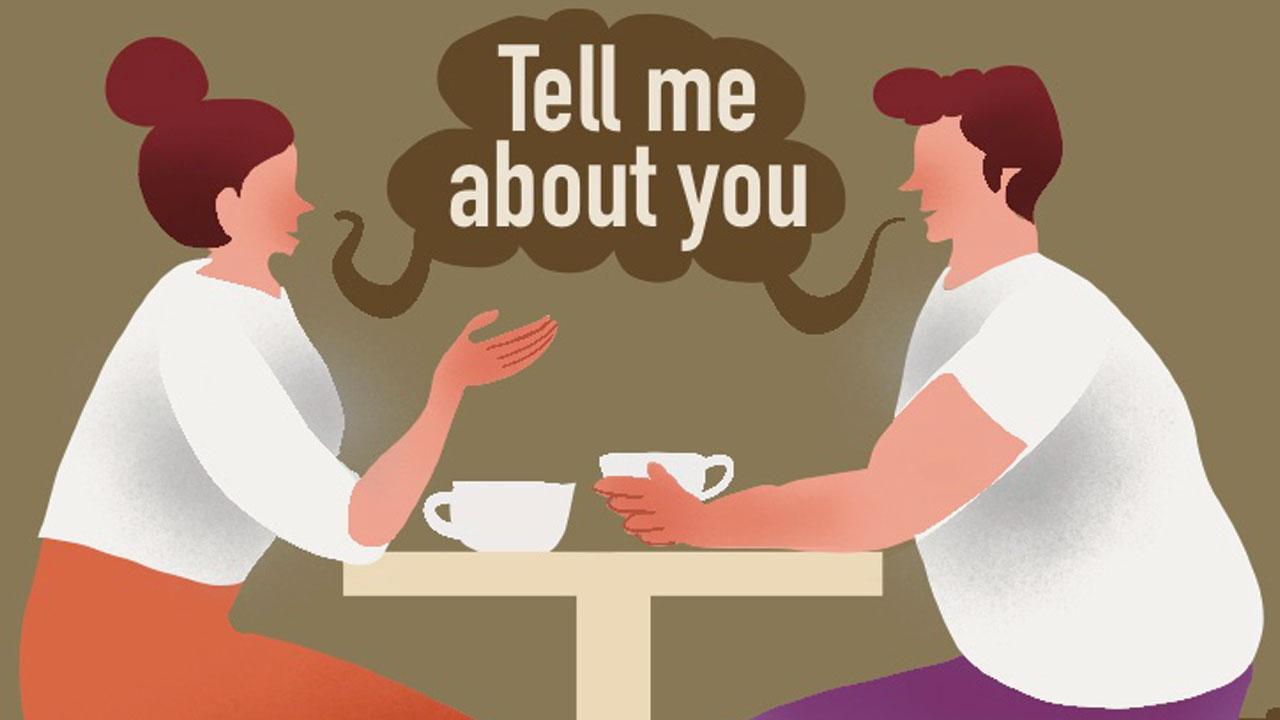Tell me about you so I am not vulnerable through an exchange of conversation. Tell me about you so the power remains with me, to judge if you’re worth it or not

Illustration/Uday Mohite
![]() Some years ago, when I polled a few people on the single most annoying question they encounter on dating apps, the answer was: tell me about you. Tell me about you, so I don’t have to make the effort to find out. Tell me about you so I am not vulnerable through an exchange of conversation. Tell me about you so the power remains with me, to judge if you’re worth it or not.
Some years ago, when I polled a few people on the single most annoying question they encounter on dating apps, the answer was: tell me about you. Tell me about you, so I don’t have to make the effort to find out. Tell me about you so I am not vulnerable through an exchange of conversation. Tell me about you so the power remains with me, to judge if you’re worth it or not.
ADVERTISEMENT
There are non-dating versions of ‘tell me about you’—people reading out your bio at events, like they are doing midnight revisions for a Sanskrit exam, as if you bear no meaning for them, only your bio does, just like on dating apps. Sometimes people invite you to an event. “I believe your work is very exciting, but I haven’t seen any of it. Can you tell me what you could talk about at our event?” Tell me about you, so that the power of rejection or acceptance remains mine, without me investing my time.
On social media we are all doing the tell me about you thing, day in and day out. Like an endless bad date, conversation as a series of disconnected soundbytes. Tell me about you so I can decide whether you are worth my follow, my like, or simply my rejecting swipe.
Once gossip existed to celebrate the idea of curiosity. Gossip was its own universe—an extension of glamour, with a wink and nudge and a little mischief, but also, a private love relationship between famous people and their fans, a means of connection. Then in an acquisition and murder deal, gossip got taken over by PR. Gossip became a kind of arranged marriage.
Soon gossip was crafted only for a purpose. PR would tell us about them only around a film launch and we became increasingly supine and flaccid, our relationship with gossip meaningless in itself, only supposed to serve the market. The conversion of private life into public relations has instrumentalised personal existence. In it, all identities are fixed, all stories are pre-decided and all meanings are literal.
This is what we see rendered in the larger media space too now—the instrumentalised market narrative style of PR is on steroids when it becomes the instrumentalised narrative of news TV, which is increasingly PR for an ideology. An old clip from a Shah Rukh Khan interview where he jokes that he will let his son do drugs and have sex when he is five or six years old. Though it is evident that it is a joke, it is easy, in an atmosphere where the dynamics of meaning making have been reduced to the literal, to use this clip to insist it is meant literally, and from there extend it to proof that Aryan Khan should be kept in jail by the NCB. Conversely, every unsaid meaning of Shah Rukh Khan’s being and actions becomes unreadable for literal minded liberals, who claim he has done nothing to strengthen plurality because he has not said the words they’d like to hear.
A literal world violently severs words from meanings, as a means of severing connections. When answers are fixed, where is the place for questions? The end of curiosity, is the beginning of absolute judgement. Tell me about you so I can denounce you, and show you I am more powerful.
Paromita Vohra is an award-winning Mumbai-based filmmaker, writer and curator working with fiction and non-fiction. Reach her at paromita.vohra@mid-day.com
 Subscribe today by clicking the link and stay updated with the latest news!" Click here!
Subscribe today by clicking the link and stay updated with the latest news!" Click here!







